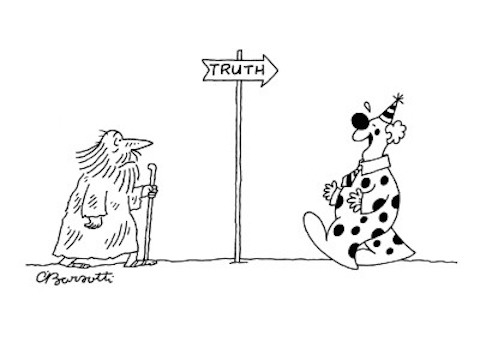
cartoon by the late, wonderful Charles Barsotti
This blog is now in its 14th year, and over that time most of the blogs I’ve followed have either ceased to exist or dwindled to a trickle. Although my posts have gradually slowed from daily to (on average) weekly, the amount that I write that is original content (as much as any commentary or fiction can really be said to be original) hasn’t fallen off all that much. And my articles have, on average, grown considerably longer. In total I’ve written about 2,000 posts, enough to fill about 7,000 pages, even without graphics — about 35 books’ worth. I keep wondering when I’ll run out of things to say.
Over this period I’ve become considerably more radical in my worldview, largely due to three astonishing realizations that have changed how I look at everything:
- Imminent Collapse: Our civilization, because of its massive complexity, dependence on debt and cheap resources, and unsustainable excesses, is going to come to an uneven and bumpy end some time in this century, and nothing we do, or stop doing, can prevent this. Our human descendants, many fewer in number than live on the planet now, will, after collapse has settled out, most likely live in amazingly diverse and culturally vibrant communities that will be unrecognizably localized, tribal, self-sufficient, opportunistic, modest and low-tech. That is, after all, how humans have, mostly, always lived.
- Universal Good Intentions: We are all doing our best. We really believe civilization culture is the pinnacle of human achievement, and to try to keep it going we have sacrificed our physical and mental health, the planet’s resources, and our humanity. We are all damaged (though many are still in denial) and trying to heal. We have desolated our planet, our home, and our spirits, in our fervent and misguided striving to make the world ‘better’. There is no evil cabal to blame, and shifting the concentration of wealth and power will achieve nothing. We’re an unforeseeable, surprising, colossal evolutionary failure. But damn we tried!
- No Separate Self: The illusion of the individual as some ‘one’, something apart from all there is, something with free will and control and responsibility, emerged as an evolutionary exaptation which was, in the short run, extremely successful, an amazing and useful trick. But it is a trick, one that our species has come to believe in so totally that we are now uniquely disconnected from all life and everything-that-is, to our endless dismay and immiseration. Billions of fearful, anxious, unhappy selves are seeking, hopelessly, to free ourselves from that illusion and find our way back to being-part-of-everything.
I sense these realizations are connected, incremental appreciations of how the world really works and what it means to be human. They now colour everything I think, believe and do, and I’m much happier and at peace as a result. But this is no accomplishment; we cannot be other than who we are.
I turned 65 this week but feel very young. Much of my young life was, sadly, full of the struggling, depression, and anxiety of the seeker in Charles’ cartoon above. Now there’s mostly playfulness, like the clown. But as the realizations above really start to really sink in, there’s this growing sense of freedom, lightness, quiet excitement, invulnerability and the inevitability of remembering, and easing back into just being. Almost home, though it’s always been right here, waiting for us all.
~~~
PREPARING FOR CIVILIZATION’S END
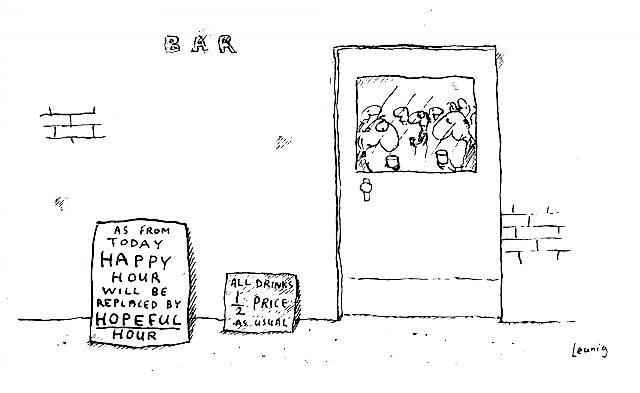
cartoon by Michael Leunig
Dark Age Ahead: Historian John Michael Greer has a new book coming out this fall, and it’s outstanding. It’s an explanation (through the lens of previous civilizational collapses) of how we got into the economic and ecological mess we now face, and the importance of starting now to (re-)learn (by trial and error) the skills your community will need as civilization’s systems increasingly break down and fall apart. John understands how complex systems work, which is refreshing. More on the book as we get closer to September publication date.
David Holmgren on Preparing for Collapse: The permaculture co-founder suggests that suburbs might fare better than cities when collapse hits full-bore, because even small plots of land around single-family dwellings might be usable for growing food. And he suggests the real hope is in the experiments that sub-cultures are doing right now in community-building and alternative ways of living and making a living. Thanks to my Bowen in Transition colleague Jessica Mitts for the link.
The Non-Dual Economist: I’ve followed Umair Haque’s writings on economics for years; he’s an original and courageous thinker. Now, following a horrible illness, he has (to my surprise and delight) discovered non-duality. Thanks to John Kellden for the link.
Property: The Second Worst Human Invention: Jared Diamond describes (monoculture “disaster”) agriculture as the worst mistake in the history of the human species. You could make a compelling argument that the invention of personal property was the second worst. Steve Roth explains that “property rights are ultimately based, purely, on coercion and (the threat of) violence.” The concept is essentially exclusionary and requires enough power and authority (outsourced these days to lawyers, police, armies and governments) to be able to coerce and inflict violence on anyone disregarding these “rights”. Matt Bruenig goes further, describing title deeds as “violence vouchers“. (Matt’s site is currently down, perhaps hacked by those who don’t like his views?). Thanks to Flemming Funch for the links.
Forgotten Knowledge: A new report from the National Academies notes that our long period of very stable climate has given us the brief luxury of forgetting what we know about how to live on the land, in the unique places we call home. But, it warns, as climate destabilizes more and more, that lost knowledge cannot be recovered in time to prevent another dark age. More or less what John Michael Greer is saying.
Unplugging the Rivers: The Colorado River provides water to one in eight Americans and supports one-seventh of the nation’s crops. But the lakes behind the dams are dwindling to the point the dams no longer make economic sense. Thanks to climate change, the Colorado River is running dry.
Wildfires Burning Earlier This Year: One of the harbingers of chronic drought and desertification is a recurrent uptick in wildfires, and we’re now into a second year in a row of more-than-usual, earlier-than-usual fires. The challenge is that the budget (and competent staffing) for wildfire fighters is already maxed out, so firefighters have to use triage — letting fires, even huge ones, that don’t immediately threaten human settlements and assets, burn out of control, to focus on the ones that do threaten humans. That means acreage lost to fires is soaring. That increases tree and groundcover losses and adds further to desertification, runoff, soil loss to wind and water, and flooding (when it does eventually rain). Just as we can no longer afford to maintain the trillions of dollars we’ve invested in fast-decaying infrastructure, we can no longer afford to keep our forests from turning to deserts as warming and extreme climate events increase.
~~~
LIVING BETTER
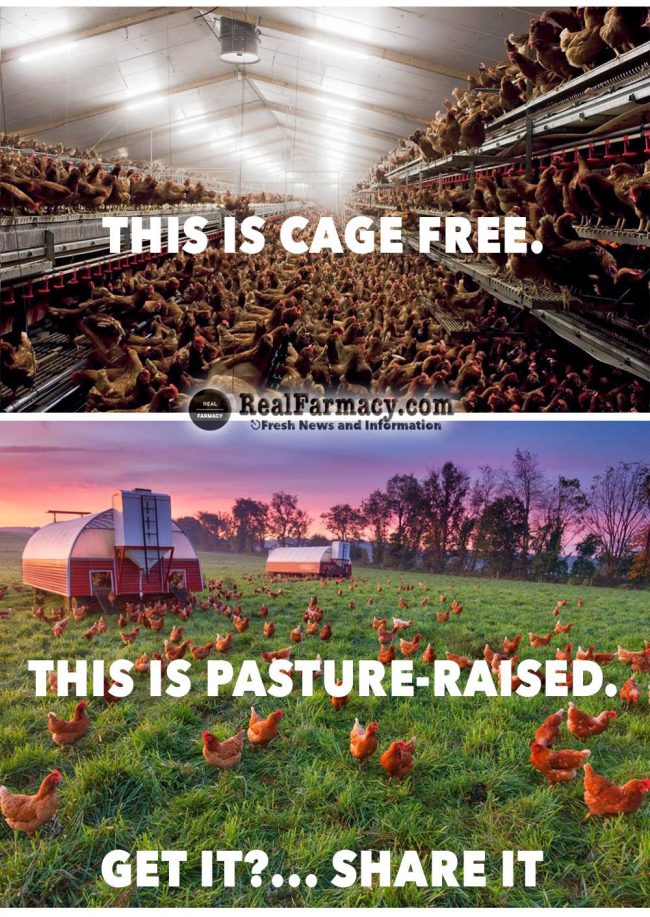
from RealFarmacy.com; thanks to Richard Saunders for the link
How Change Actually Happens: Victoria BC sustainability consultant Ruben Anderson takes on the issue of free will, and concludes that we might have it on rare occasions. But his best insight is about how change (in human behaviour) actually happens, and why (often) a desired, expected or coerced change doesn’t happen. Here’s the ‘aha’ punch line:
Since most of our behaviour is reactive to our physical and social contexts, the most effective way to change people’s behaviour is to change the context. Regardless of the speed limit, if the road is wide and straight, people drive fast. If the road is narrow and twisty, people drive slow. The most effective way to change behaviour is NOT to educate and inform people about the dangers of speeding, then post a speed limit and expect them to make a good choice with their free will—especially when everyone around them, their social context, is responding appropriately to the physical context of the wide road by driving faster than the posted speed limit. Imagine how we might respond to issues if we stopped telling a story that behaviour is a product of choice, and instead compassionately acknowledged it is mostly a product of context. Think of the lives lost and families destroyed by lung cancer, drunk drivers, malnutrition, poverty, and lack of exercise. Think of arguments with loved ones and lost friendships. Think of the billions wasted on ineffective infrastructure. Think of the school system and the justice system.
Consensus Always Decays: An interesting article by Richard Bartlett explains that, even in organizations where consensus has worked well, turnover and changing conditions can start to erode trust and mutual understanding, so that needs to be continuously cultivated, like a garden. Thanks to Tree for the link.
~~~
POLITICS AND ECONOMICS AS USUAL
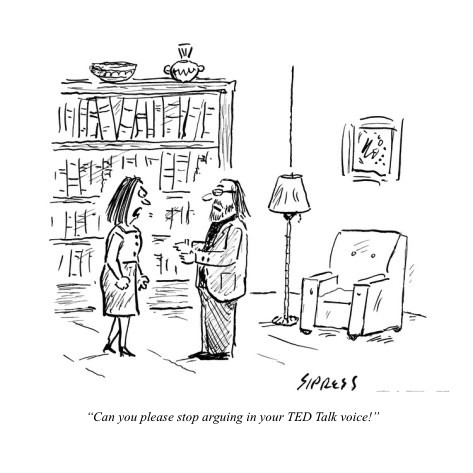
David Sipress cartoon from The New Yorker
Why Are We Being Fed By a Poison Expert: The Undercurrent explains how Monsanto gets away with what they do. Thanks to David Griffiths for the link.
Killing Environmentalists: Investigative reporters at Global Witness survey the near-record 185 environmental activists murdered last year.
Death to the Poor: In the US now, depending on where you live, the rich live 11-15 years longer than the poor, and the spread is getting worse.
Coopting the New Economy: After corrupting the idea of the Sharing Economy with profit-seeking commercial ventures, the vultures are now trying to co-opt the idea of Co-Working, turning it from a communal, cooperative activity to a new way to make real estate profits and rental income. Thanks to Tree for the link.
Canadian Incompetence Corner:
The Globe’s Worst Writer Hangs On: The Globe’s most right-wing reporter and serial plagiarist Margaret Wente is still working for the newspaper. The essence of conservative privilege during this period of declining empire seems to be that if you have money, you are entitled to do anything with impunity.
Trudeau, the next hopeless Obama clone: Canada’s new PM shows stunning wishy-washiness producing a long-awaited assisted suicide bill that is so compromised to various interests watering it down, that his own party members already assert it will be struck down as unconstitutional, just like the previous more egregious law was. Canadians will have to continue to fly to more civilized places for merciful end-of-life health services until we get a more principled government.
Ghomeshi Gets Off: Read Kathryn Borel’s courageous and damning indictment of the ex-CBC host, the CBC establishment and the Canadian legal system that exonerated him.
And Duffy Gets Off: So far, Harper’s wacky Senator Mike Duffy has been cleared of 31 fraud charges over his expenses, costing the Canadian taxpayer half a million dollars for nothing. Another ‘entitled’ right-winger from the Canadian media, Duffy has spent taxpayers’ money like water, but the courts found the real villain in his dubious expense claims was the Harper Prime Minister’s Office that quietly told him this was all OK. Now the ethics commission, trying to save face, is investigating that office.
~~~
FUN AND INSPIRATION

Photo: Tui birds, by my friend Pohangina Pete
The Earth From Space: A new film Overview describes how astronauts felt seeing the Earth from space for the first time, especially the “paper-thin layer” of our atmosphere, the scars humans have inflicted on our planet’s surface, and the sense of being a part of all life. Thanks to Liliana for the link.
Why You Will Marry the Wrong Person: Three reasons: (1) we reject “certain candidates for marriage not because they are wrong but because they are too right — too balanced, mature, understanding and reliable — given that in our hearts, such rightness feels foreign”; (2) we may find our anxiety about being forever “single” outweighs our common sense in waiting for the right person; and (3) we want desperately to make the good feelings of falling in love last: “We imagine that marriage will help us to bottle the joy we felt when the thought of proposing first came to us.”
The Comma Queen: New Yorker editor Mary Norris has a whole series of fascinating and charming short videos about grammar, punctuation and spelling.
~~~
THOUGHTS OF THE QUARTER
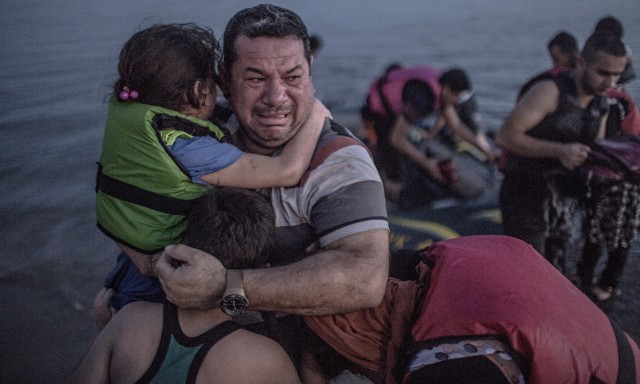
This image above and the poem below are from the blog SeekersClub; thanks to Eric Lilius for pointing me to it. Photo credit above: Daniet Etter/New York Times/Redux /eyevine. “Syrian refugee Laith Majid cries tears of joy and relief that he and his children have made it to Europe.”
“Home”, by Warsan Shire:
no one leaves home unless
home is the mouth of a shark
you only run for the border
when you see the whole city running as well
your neighbors running faster than you
breath bloody in their throats
the boy you went to school with
who kissed you dizzy behind the old tin factory
is holding a gun bigger than his body.
you only leave home
when home won’t let you stay.
no one leaves home unless home chases you
fire under feet
hot blood in your belly
it’s not something you ever thought of doing
until the blade burnt threats into
your neck
and even then you carried the anthem under
your breath
only tearing up your passport in an airport toilet
sobbing as each mouthful of paper
made it clear that you wouldn’t be going back.
you have to understand,
that no one puts their children in a boat
unless the water is safer than the land
no one burns their palms
under trains
beneath carriages
no one spends days and nights in the stomach of a truck
feeding on newspaper unless the miles travelled
mean something more than a journey.
no one crawls under fences
no one wants to be beaten
pitied
no one chooses refugee camps
or strip searches where your
body is left aching
or prison,
because prison is safer
than a city of fire
and one prison guard
in the night
is better than a truckload
of men who look like your father
no one could take it
no one could stomach it
no one skin would be tough enough
the
go home blacks
refugees
dirty immigrants
asylum seekers
sucking our country dry
niggers with their hands out
they smell strange
savage
messed up their country and now they want
to mess ours up
how do the words
the dirty looks
roll off your backs
maybe because the blow is softer
than a limb torn off
or the words are more tender
than fourteen men between
your legs
or the insults are easier
to swallow
than rubble
than bone
than your child body
in pieces.
i want to go home,
but home is the mouth of a shark
home is the barrel of the gun
and no one would leave home
unless home chased you to the shore
unless home told you
to quicken your legs
leave your clothes behind
crawl through the desert
wade through the oceans
drown
save
be hunger
beg
forget pride
your survival is more important
no one leaves home until home is a sweaty voice in your ear
saying-
leave,
run away from me now
i don’t know what i’ve become
but i know that anywhere
is safer than here
(The poetry and prose extracts below are all from the blog Words for the Year, which posts an exemplary piece of writing daily.)
By David Foster Wallace, from Oblivion:
The truth is you already know what it’s like. You already know the difference between the size and speed of everything that flashes through you and the tiny inadequate bit of it all you can ever let anyone know. As though inside you is this enormous room full of what seems like everything in the whole universe at one time or another and yet the only parts that get out have to somehow squeeze out through one of those tiny keyholes you see under the knob in older doors. As if we are all trying to see each other through these tiny keyholes.
But it does have a knob, the door can open. But not in the way you think. The truth is you’ve already heard this. That this is what it’s like. That it’s what makes room for the universes inside you, all the endless inbent fractals of connection and symphonies of different voices, the infinities you can never show another soul.
By Warsan Shire, from “What They Did Yesterday Afternoon”:
they set my aunt’s house on fire
i cried the way women on tv do
folding at the middle
like a five pound note.
i called the boy who used to love me
tried to ‘okay’ my voice
i said hello
he said warsan, what’s wrong, what’s happened?
i’ve been praying,
and these are what my prayers look like;
dear god
i come from two countries
one is thirsty
the other is on fire
both need water.
later that night
i held an atlas in my lap
ran my fingers across the whole world
and whispered
where does it hurt?
it answered
everywhere
everywhere
everywhere.
By Annie Dillard, from Pilgrim at Tinker Creek:
About five years ago I saw a mockingbird make a straight vertical descent from the roof gutter of a four-story building. It was an act as careless and spontaneous as the curl of a stem or the kindling of a star.
The mockingbird took a single step into the air and dropped. His wings were still folded against his sides as though he were singing from a limb and not falling, accelerating thirty-two feet per second per second, through empty air. Just a breath before he would have been dashed to the ground, he unfurled his wings with exact, deliberate care, revealing the broad bars of white, spread his elegant, white-banded tail, and so floated onto the grass. I had just rounded a corner when his insouciant step caught my eye; there was no one else in sight. The fact of his free fall was like the old philosophical conundrum about the tree that falls in the forest. The answer must be, I think, that beauty and grace are performed whether or not we will or sense them. The least we can do is try to be there.
By Dorianne Laux, “Twelve Days of Rain”, from What We Carry:
I couldn’t name it, the sweet
sadness welling up in me for weeks.
So I cleaned, found myself standing
in a room with a rag in my hand,
the birds calling time-to-go, time-to-go.
And like an old woman near the end
of her life I could hear it, the voice
of a man I never loved who pressed
my breasts to his hips and whispered
“My little doves, my white, white lilies.”
I could almost cry when I remember it.
I don’t remember when I began
to call everyone “sweetie,”
as if they were my daughters,
my darlings, my little birds.
I have always loved too much,
or not enough. Last night
I read a poem about God and almost
believed it—God sipping coffee,
smoking cherry tobacco. I’ve arrived
at a time in my life when I could believe
almost anything.
Today, pumping gas into my old car, I stood
hatless in the rain and the whole world
went silent—cars on the wet street
sliding past without sound, the attendant’s
mouth opening and closing on air
as he walked from pump to pump, his footsteps
erased in the rain—nothing
but the tiny numbers in their square windows
rolling by my shoulder, the unstoppable seconds
gliding by as I stood at the Chevron,
balancing evenly on my two feet, a gas nozzle
gripped in my hand, my hair gathering rain.
And I saw it didn’t matter
who had loved me or who I loved. I was alone.
The black oily asphalt, the slick beauty
of the Iranian attendant, the thickening
clouds—nothing was mine. And I understood
finally, after a semester of philosophy,
a thousand books of poetry, after death
and childbirth and the startled cries of men
who called out my name as they entered me,
I finally believed I was alone, felt it
in my actual, visceral heart, heard it echo
like a thin bell. And the sounds
came back, the slish of tires
and footsteps, all the delicate cargo
they carried saying thank you
and yes. So I paid and climbed into my car
as if nothing had happened—
as if everything mattered — What else could I do?
I drove to the grocery store
and bought wheat bread and milk,
a candy bar wrapped in gold foil,
smiled at the teenaged cashier
with the pimpled face and the plastic
name plate pinned above her small breast,
and knew her secret, her sweet fear—
Little bird. Little darling. She handed me
my change, my brown bag, a torn receipt,
pushed the cash drawer in with her hip
and smiled back.
By David White, from Sweet Darkness:
You must learn one thing.
The world was made to be free in
Give up all the other worlds
except the one to which you belong.
Sometimes it takes darkness and the sweet
confinement of your aloneness
to learn
anything or anyone
that does not bring you alive
is too small for you.
By Rosemarie Urquico, “You Should Date a Girl Who Reads”:
Date a girl who reads. Date a girl who spends her money on books instead of clothes, who has problems with closet space because she has too many books. Date a girl who has a list of books she wants to read, who has had a library card since she was twelve.
Find a girl who reads. You’ll know that she does because she will always have an unread book in her bag. She’s the one lovingly looking over the shelves in the bookstore, the one who quietly cries out when she has found the book she wants. You see that weird chick sniffing the pages of an old book in a secondhand book shop? That’s the reader. They can never resist smelling the pages, especially when they are yellow and worn.
She’s the girl reading while waiting in that coffee shop down the street. If you take a peek at her mug, the non-dairy creamer is floating on top because she’s kind of engrossed already. Lost in a world of the author’s making. Sit down. She might give you a glare, as most girls who read do not like to be interrupted. Ask her if she likes the book.
Buy her another cup of coffee.
Let her know what you really think of Murakami. See if she got through the first chapter of Fellowship. Understand that if she says she understood James Joyce’s Ulysses she’s just saying that to sound intelligent. Ask her if she loves Alice or she would like to be Alice.
It’s easy to date a girl who reads. Give her books for her birthday, for Christmas, for anniversaries. Give her the gift of words, in poetry and in song. Give her Neruda, Pound, Sexton, Cummings. Let her know that you understand that words are love. Understand that she knows the difference between books and reality but by god, she’s going to try to make her life a little like her favorite book. It will never be your fault if she does.
She has to give it a shot somehow.
Lie to her. If she understands syntax, she will understand your need to lie. Behind words are other things: motivation, value, nuance, dialogue. It will not be the end of the world.
Fail her. Because a girl who reads knows that failure always leads up to the climax. Because girls who read understand that all things must come to end, but that you can always write a sequel. That you can begin again and again and still be the hero. That life is meant to have a villain or two.
Why be frightened of everything that you are not? Girls who read understand that people, like characters, develop. Except in the Twilight series.
If you find a girl who reads, keep her close. When you find her up at 2 AM clutching a book to her chest and weeping, make her a cup of tea and hold her. You may lose her for a couple of hours but she will always come back to you. She’ll talk as if the characters in the book are real, because for a while, they always are.
You will propose on a hot air balloon. Or during a rock concert. Or very casually next time she’s sick. Over Skype.
You will smile so hard you will wonder why your heart hasn’t burst and bled out all over your chest yet. You will write the story of your lives, have kids with strange names and even stranger tastes. She will introduce your children to the Cat in the Hat and Aslan, maybe in the same day. You will walk the winters of your old age together and she will recite Keats under her breath while you shake the snow off your boots.
Date a girl who reads because you deserve it. You deserve a girl who can give you the most colorful life imaginable. If you can only give her monotony, and stale hours and half-baked proposals, then you’re better off alone. If you want the world and the worlds beyond it, date a girl who reads.
Or better yet, date a girl who writes.




